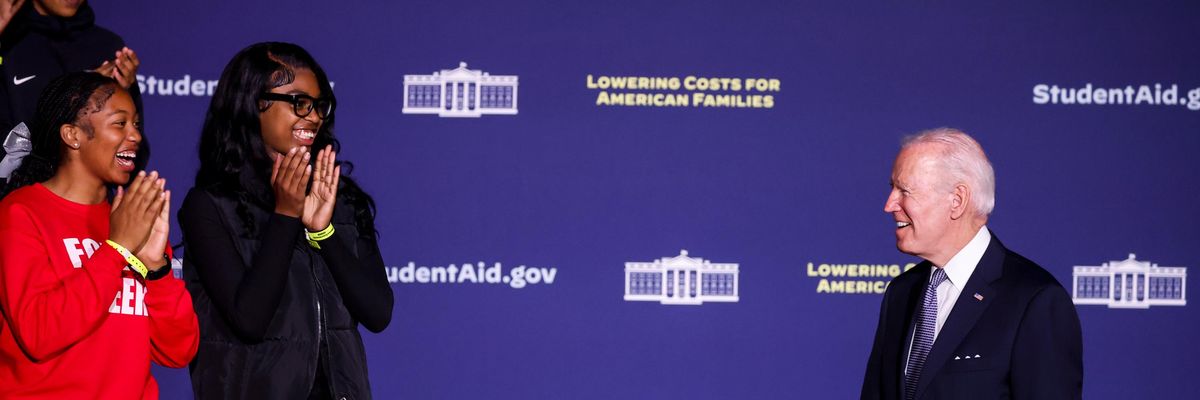Student debt cancellation advocates renewed calls for relief Thursday after the right-wing U.S. Supreme Court agreed to hear oral arguments for a case challenging President Joe Biden's forgiveness plan in February.
"It is up to SCOTUS to grant borrowers the greater opportunity for upward mobility that is so often out of reach for those burdened with student debt."
"We must cancel student debt," the NAACP tweeted. "The Biden administration did their part in taking the first step. Now, it is up to SCOTUS to grant borrowers the greater opportunity for upward mobility that is so often out of reach for those burdened with student debt."
The president's plan, unveiled in August, would wipe away up to $20,000 for Pell Grant recipients and $10,000 for other federal borrowers with incomes under $125,000 for individuals or $250,000 for households. GOP politicians and activists responded with a flurry of lawsuits, leading the administration last month to extend a freeze on loan repayments until next June.
The Biden administration also asked the nation's high court to weigh in last month after the St. Louis-based 8th U.S. Circuit Court of Appeals put the cancellation program on hold.
The justices' announcement Thursday about arguments for Biden v. Nebraska came a day after the New Orleans-based 5th U.S. Circuit Court of Appeals rejected the administration's request to pause another order from a district judge blocking debt relief.
"This string of rulings is an early Christmas present to the greedy student loan servicer industry and conservative activists that stand in the way of economic relief and security for millions of Americans," said Liz Zelnick, a spokesperson for the watchdog Accountable.US, in a statement Thursday afternoon.
"The political lawsuits attacking the administration's relief policies are based on nothing more than industry greed and blind partisan obstruction against President Biden's policies that prioritize average Americans," Zelnick added. "The right-tilted Supreme Court now holds in the balance relief for millions of hardworking Americans who are simply trying to get ahead. It would be a giant loss for the economy if justices rule in favor of the special interests."
Student Borrower Protection Center executive director Mike Pierce stressed that "the letter of the law is clear: Canceling student debt was legal when Joe Biden announced his historic debt relief plan in August and remains so today."
"In the wake of a series of radical decisions decimating fundamental rights Americans hold dear, the public now rightfully questions whether this court is interested in pursuing justice or upholding the rule of law," he added. "Once again, the credibility of the Supreme Court rests on its ability to recognize what we all know to be true: Canceling student debt is legal and necessary to secure the financial futures of 40 million Americans. We remain confident that the president's right-wing opponents will not bait him into becoming America's student debt collector and will keep fighting in and out of court to keep his promise to cancel student debt."
The justices "put the case on an unusually fast track" but also "left in place an injunction blocking the program," The New York Times' Adam Liptak highlighted. "The court's brief order gave no reasons and did not note any dissents."
Polling released Wednesday by Morning Consult showed that Americans are most inclined to blame conservative judges and Republicans in Congress for delayed relief from student debt. The survey, conducted in November, also revealed that two-thirds of people with federal student loans have struggled to afford payments.
This post has been updated with comment from the Student Borrower Protection Center.




